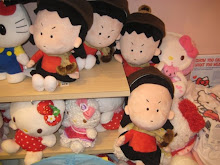The UCLA ASIAN AMERICAN STUDIES CENTER, in celebration of its 40th anniversary, cordially invites you to attend a free, public symposium on Asian American artists, in conjunction with the Hammer Museum . . .
ASIAN AMERICAN ARTISTS IN CALIFORNIA
A Symposium
Saturday, March 14, 2009
9:00am - 1:00pm
Armand Hammer Museum
10899 Wilshire Blvd
Los Angeles, CA 90024
(located at the northeast corner of Westwood and Wilshire Boulevards in Westwood Village
3 blocks east of the 405 freeway's Wilshire Boulevard exit)
This event is free and open to the public. RSVP is requested. Please call (310) 825-2974 or
e-mail aascrsvp@aasc.ucla.edu by March 13, 2009.
Parking is available under the Museum. Rates are $3 for the first three hours with Museum stamp; $1.50 for each additional 20 minutes. Parking for people with disabilities is provided on levels P1 and P3.
This program is one of the events celebrating the 40th Anniversary of the UCLA Asian American Studies Center and other ethnic studies centers at UCLA.
For more information, call (310) 825-2974.
Introduction
From the Chinese photographers of the Gold Rush to contemporary video artists, men and women of Asian descent have produced a rich and diverse body of artwork. Examining the lives and work of artists past and present offers insights into issues of cultural hybridity, race, social climate, and transnationalism.
This symposium will celebrate the publication of the landmark Asian American Art, A History, 1850-1970, edited by Gordon H. Chang, Mark Johnson, and Paul Karlstrom, as well as present the dynamic work of three present-day artists in southern California. Asian American Art, A History is the first comprehensive study of more than 150 early artists in the United States before 1970. Artists of Asian ancestry have received little historical attention, even though many of them received wide critical acclaim during their productive years. This pioneering work recovers the impressive artistic production of numerous Asian Americans, and brings to light their extraordinary range of vision and media. Amazon.com is giving a 34% discount (only $26.37 instead of $39.95) AND free shipping for this book. The UCLA Bookzone at Ackerman Student Union is giving a 30% discount. Purchase ahead for the best deal.
The first panel explores the history of long-neglected artists, beginning with Sharon Spain's discussion of the innovative research project that gave rise to the book. Mark Johnson draws attention to the development of an international artistic sensibility among 19th-century Asian American practitioners, Karin Higa illuminates how the creative activity rooted in 1930s Little Tokyo also moved in national and global contexts. Gordon Chang considers the connection of war and art as well as the power of art to influence public mood.
For the second panel, contemporary artists Reanne Estrada, Yong Soon Min, and Viet Le discuss their work within a transnational context. Reanne Estrada reflects on the Galleon Trade project, a series of exhibitions and programs highlighting the linkages among the Philippines, Mexico and California. Yong Soon Min-decolonial art activist and scholar-will speak about her projects, including "transPOP: Korea Viet Nam Remix," co-curated with Viet Le, an artist and creative writer who examines memory, AIDS and representation in Southeast Asia and its diasporas.
Panelist Bios
Sharon Spain has been the associate director of the Asian American Art Project since 2004 and has managed the California Asian American Artists Biographical Survey project for more than ten years. She holds an M.A. in museum studies and has overseen major exhibition and publication projects, including Chang Dai-chien in California.
Mark Johnson is professor of art at San Francisco State University. He is the co-editor of Asian American Art: A History, 1850-1970, and guest curator for the de Young Museum exhibition Asian/American/Modern Art: Shifting Currents, 1900-1970' (2008) and other exhibitions of Asian American historical art.
Karin Higa is adjunct senior curator of art at the Japanese American National Museum where she recently curated "Living Flowers: Ikebana and Contemporary Art." She is currently working on a study of art and culture in Los Angeles's Little Tokyo between World War I and II.
Gordon Chang is a professor of history at Stanford University. The author of numerous books and articles, he recently co-edited both Asian American Art: A History, 1850-1970 and Chinese American Voices: From the Gold Rush to the Present.
Valerie J. Matsumoto, an associate professor in history and Asian American Studies at UCLA, is a contributor to Asian American Art, A History, 1850-1970. She has just completed a study of Japanese American women in Los Angeles from the Jazz Age to resettlement after World War II.
Reanne Estrada, a Los Angeles-based visual artist, collaborates with Eliza Barios and Jenifer Wofford as Mail Order Brides/M.O.B. on video and works with Public Matters to integrate public-purpose media production with civic engagement.
Yong Soon Min, professor of Studio Art at the University of California, Irvine, incorporates interdisciplinary sources and processes to engage issues of representation and cultural identities. Her work has been widely shown in exhibitions such as the 10th Havana Bienal and the 7th Gwangju Biennale.
Viet Le is an artist, creative writer, and Ph.D. candidate at the University of Southern California. His work has been featured in the Asian Pacific American Journal and anthologies such as So Luminous the Wildflowers; he has exhibited at DoBaeBacSa Gallery, Korea, The Banff Centre, Canada, and the Shoshin Performance Space in New York.
Aimee Chang is Director of Academic Programming and Artist Residencies at the Hammer Museum.
Schedule
9:00-9:30am Registration
9:30-10:50 Art History Panel (Sharon Spain, Mark Johnson, Gordon Chang, and Karin Higa; moderated by Professor Valerie Matsumoto)
10:50-11:00 Break
11:00-12:20 Contemporary Artists Panel (Yong Soon Min, Reanne Estrada, Viet Le; moderated by Aimee Chang)
Book signing afterward
Subscribe to:
Post Comments (Atom)




No comments:
Post a Comment